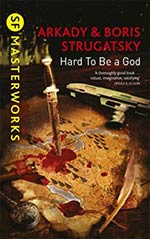
![]() thrak
thrak
4/25/2015
![]()
"How I'd like to let out some of the hatred that's accumulated over the past twenty-four hours, but it looks like I'll have no luck. Let us remain humane, forgive everyone, and be calm like the gods. Let them slaughter and desecrate, we'll be calm like the gods. The gods need not hurry, they have eternity ahead."
In 'Hard To Be A God', Arkady and Boris Strugatsky explore the rise of totalitarianism, and the inadequacies of theories of history to deal with actual history unfolding. The story is set on a planet with medieval level technology, where the kingdom of Arkanar is undergoing a power shift as the king's minister, in a flurry of anti-intellectual paranoia, is creating a pervasive and controlling state based on fear and oppression. The main character, Anton, is a historian from a utopian Earth of the future, sent to study the unfolding of history on an alien planet, is bound by a rule of non-interference similar to the Prime Directive in Star Trek; he does what he can to save the lives of the intellectuals hounded by Don Reba's storm troopers, but he is not allowed to interfere with the natural unfolding of history. As the situation in Arkanar grows more and more violent and out of control, Anton finds himself increasingly at odds with his superiors, who insist that, as their theory of history does not allow for the development of totalitarianism out of a medieval society, the situation cannot be as desperate as he paints it.
'Hard To Be A God' deals with the key theme that runs through much of the Strugatsky's work, censorship and the artist's struggle against it. As in 'Definitely Maybe', the novel features artists who come up against powerful forces wishing to silence them, in this case Don Reba's storm troopers, and, as they would in that later novel, the Strugatsky brothers explore the different ways in which different people respond to censorship and state-sponsored oppression. The Strugatskys quite rightly identify censorship of ideas as a key sign that something has gone deeply wrong with a society. Arkanar is being manipulated by Don Reba into fearing and distrusting new ideas and perspectives, vilifying and persecuting the very people who are capable of dragging them out of the middle ages, something that can only lead to its stagnation. Anton tries desparately to save the artists and scientists of Arkanar, some of whom are stripped of honour and property and beaten, imprisoned, executed, or else compromise their art and integrity by pandering to the strictures set out by the state.
The book's setting allows it to mingle the tropes of science fiction and Fantasy, and to subvert the standard middle ages setting of much Fantasy in interesting ways. Because we experience the world through the eyes of Anton, in the guise of Don Rumata, the well-connected noble he pretends to be in Arkanar, we see it through a perspective closer to our own than those who live in it. Anton is disgusted by both the social injustices of the rigidly feudal system and the technological backwardness of the people who live in it. By pointing out how bad the people smell because of the lack of modern hygiene makes the medieval setting, which could be overly familiar to readers of genre fiction, especially vivid and resonant for the reader. This allows the Strugatskys to humourously satirise the upper classes, who strut around assuming their natural superiority whilst appearing to Anton and the reader as drunken buffoons. It's also part of how the Strugatskys subvert the general tropes and expectations of the book's medieval, Fantasy-esque setting. 'Hard To Be A God' deconstructs the idea of chivalrous noblemen as brutally as George R. R. Martin's A Song Of Ice And Fire, with the Strugatskys portraying them as self-interested, aggressive, drunken boors. Similarly, the book plays with Fantasy mythology. There's an excellent passage where the authors describe the legends and myths that have built up around the Hiccup Forest, before revealing that they have been put in place there and exaggerated to hide the Earth people's secret base.
'Hard To Be A God' is thoroughly cynical about human nature. While it features, on its periphery, a utopian society on Earth, it is fully aware of the horrors of history that humanity has had to go through to get to its current state of enlightenment. Don Reba's name is derived from Lavrenty Beria, Stalin's brutal secret police chief, and his horrific methods and brutality echo those of his real life basis. His betrayal and destruction of his own storm troopers when they get too powerful echoes Hitler and Himmler's destruction of Ernst Rohm and the SA, and his torture chambers are reminiscent of the horrors of the Spanish Inquisition. The Strugatskys acknowledge the violence and suffering which have shaped human history, but also the pettiness of human nature that drives much of history. The noblemen make ludicrous decisions because they're permanently drunk, which makes them particularly easy for Reba to manipulate. The feudal rights of the Barons Pampa wind up having to be fought for each generation in a wasteful, expensive and unnecessary war which always has the same outcome, all for silver mines which cost less than the war does and laughably trivial privileges for the Barons. The Stugatskys have a hope for what humanity can become, but despair at its violence, cruelty and idiocy. This despair ultimately overtakes poor Anton, as circumstances get to the stage where he is no longer able to stand by dispassionately. He reaches the point where whatever he does he winds up with blood on his hands, but his decisive action only causes more death and destruction.
http://goldenapplesofthewest.blogspot.co.uk/2015/04/arkady-and-boris-strugatsky-hard-to-be.html